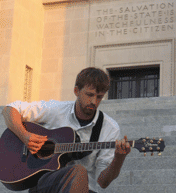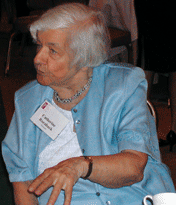If It’s Tuesday, This Must Be Topeka
September/October 2005
by Alejandra O’Leary ’04
This summer, singer-songwriter Webster McBride ’99 set out to visit all 50 American state capitals and Washington, D.C., to perform on the steps of each capitol building. His plan was to stay in each state for one night and finish the trip in exactly 51 days. Except for flights to Honolulu and Juneau, McBride drove the entire journey in his green 1994 Dodge Caravan—with no air conditioning. When he is not working as an information technology consultant in Berkeley, California, McBride dedicates his time to his experimental pop band, Golden Birds, whose new album is appropriately titled Transamerica. This interview was conducted in the middle of his summer odyssey.
Y: You’re in Springfield, Illinois, tonight playing your 27th show. It’s been 26 days. Are you exhausted?
| |
“There’s such a sense of detachment from American seats of power.”
|
M: Physically, the trip has not been bad at all. It’s certainly much less taxing than going to work every day. Psychologically, it’s been more interesting—I have to reacclimatize every night. I’m always a guest, both in people’s homes and in these capital cities. It’s very strange to do that every single day.
Y: How do people hear about your trip and your shows?
M: I’m just warning you that we might lose phone service here—I’m in the middle of a lot of cornfields right now. People hear about the shows almost exclusively through word of mouth. The trip has been most exciting when it’s brought me in contact with strangers. A woman in Hawaii heard about the trip and volunteered to pick me up at the airport—we hung out for the whole day. And last night in Madison a guy who had heard about the trip rehearsed with me and played stand-up bass at the show.
Y: What have the audiences been like?
M: They’ve varied. About one fourth of the shows, nobody comes. About one fourth of the shows, I get “large crowds” of 10 to 20 people, and about half the time we get 1 to 10 people, an average crowd. People like to request songs. In Denver, I performed, or butchered, an impromptu “Dancing in the Dark” for a total stranger.
Y: Are those numbers disappointing to you?
M: Oh, not at all. The first time that there was nobody there—in Arizona—it was really powerful. Since the election, there’s such a sense of detachment from American seats of power. It felt appropriate to be singing just to the building.
Y: So what is your motivation for this tour?
M: The overarching theme is of direct engagement, direct communication. Touring with bands in the past, it was weird spending six hours every night in a club or an art space behind closed doors, not really exposed to where I was. In a sense I could have been anywhere. So this is a tour that works against a general sense of detachment.
Y: Do you know what you’ll do with this experience when the trip is over? Will you write about it?
M: For some of the trip I’m traveling with a documentary filmmaker friend—who also accompanies me on glockenspiel at some of the shows—so there may be a film. But I want to finish the trip and then think about what to do with it. I’m not coming at this as a writer or a critic but instead as somebody who loves what this country could be.

Civil Actions
September/October 2005
by Melinda Tuhus
Forty years ago this summer, Catherine Roraback ’48LLB was part of the legal team that established the right of married couples to receive birth control counseling from their doctors. The challenge to Connecticut’s birth-control ban, by Roraback and Yale law professors Fowler Harper and Thomas Emerson '31LLB, went to the Supreme Court, whose decision in Griswold v. Connecticut established the Constitutional right to privacy. Roraback, who has focused her career on civil liberties, practices in Canaan, Connecticut.
Y: Forty years later, what do you think was important about Griswold v. Connecticut?
| |
Birth control allowed women to control their lives and make plans.
|
R: It freed women to be able to control their reproductive systems, and to be able to control their lives that way, so they could make plans. It began the development of the law so that women should have this right to control their bodies.
Y: The Law School now is 44 percent women, but you were the only woman in your graduating class in 1948.
R: I never had this sense that it was something unusual. My uncle and grandfather were attorneys. In the term I finished, I was the only woman, but when I was at the Law School there were 30 women out of 450.
Y: Over the decades, you’ve worked on many of the defining civil liberties cases of our time—defending communists in the 1950s, conscientious objectors in the 1960s, Native American activists and Black Panthers in the 1970s, and decades' worth of cases involving women’s reproductive issues. How did you decide which cases to take on?
R: I wasn’t picking and choosing. If an important case arose, I got involved, and I don’t remember saying no.
Y: You’re 84, and still go regularly to your office. What kind of work are you doing now?
R: People call me because I’ve been a lawyer here in Canaan for a long time. I give them a place to air their thoughts. I talk to various people to see how the problem could be approached and recommend a lawyer.
Y: You were known for your meticulous research. Can you give me an example?
| |
“A man from the American Indian Movement told her the store had been ‘liberated.’”
|
R: I did a case involving a Native American woman who was not anyone very political. She lived on the Rosebud reservation [in South Dakota]. She went to the general store, and one of the men from the American Indian Movement told her the store had been “liberated.” So she took a few things from the store and went back home. The marshals followed her home and seized all the stuff and charged her with theft. I filed a motion to suppress all the stuff they'd taken from the general store. In court, as each of the seized items was being introduced into evidence, I asked the marshal to describe each item, where they had found this or that. The marshal described a box of Pampers, a little toy dump truck, and some candy. I asked him where he had found the candy. The marshal began to look a little embarrassed, because he'd found it in the baby’s mouth. It was the funniest moment in my career.
Y: The marshal took the candy from the baby’s mouth?
R: Yes, the defendant had a little baby who had started to cry when all this hullabaloo started, and the grandmother stuck a piece of candy in the baby’s mouth. It was one of those classic moments. I won the motion to suppress because the evidence had been improperly seized, but I also knew the judge was not about to try a case where they take candy out of a baby’s mouth.  |



